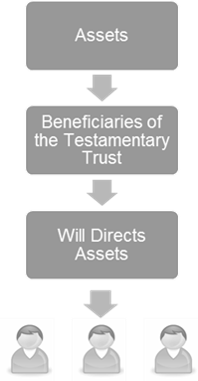Estate planning is an important part of your overall financial plan to protect your family and yourself. This includes ensuring you have considered and implemented the following aspects:
The two main aims of estate planning are to ensure that your assets (held both inside and outside superannuation) are distributed appropriately upon your death and that your finances are looked after if you are no longer able to make these decisions.
The first step is to think about what you own and who you would like to receive these assets when you pass away.
You can then specify these wishes in the appropriate legal documents or set up appropriate structures.
You may also need to think about ensuring someone else can manage affairs if you are no longer able to do this on your own where:
You pass away with young children – you may wish to nominate a guardian for your children in your Will
You lose mental capacity – Powers of Attorney/Guardianship will allow someone you trust to make decisions on your behalf
You should always seek legal advice to set up your instructions and your estate plan.



A Will is a legal document that outlines your wishes for how to distribute your assets after your death. It will only deal with assets that end up in your estate so it does not cover:
Jointly owned assets
Assets held in a private company or discretionary family trust
Insurance policies/bonds if you have nominated someone as the direct beneficiary
Superannuation, unless the trustee pays your money to your estate
If drafted properly, a Will can help to avoid family disputes and ensuing legal costs. It is important to have a Will even if you think your circumstances are very simple.
When deciding what to include in your will some things to consider are:
Identify all your assets and which ones will form part of your estate
Decide if you want to leave any specific assets to certain individuals
Decide who you wish to benefit from your estate – the Family Provision Legislation may require you to provide for certain family members so you should ensure they are all considered
Choose someone to be your Executor – this can be more than one person and they should be willing and able to accept the role
These are only a few questions to start thinking about before you speak with your legal adviser.
If you do not have a Will or your Will is invalid, you will be deemed to die intestate. This means the legislation in your state/territory will determine how your assets are distributed. This may not be consistent with your wishes.
You should review your Will regularly to ensure it continues to reflect your wishes. Make sure you consider any changes in your personal situation, e.g. marriage, divorce, birth of a child or purchase/sale of assets.
A Power of Attorney is a legal document that allows another person to undertake specified activities on your behalf. This person should be someone you trust who is willing to take on the responsibility.
A General Power of Attorney may be for a specific action (such as selling an asset while you are overseas) or broad powers (such as being able to deal with all your financial affairs).
An Enduring Power of Attorney is often used to allow a person to act on your behalf when you are no longer able to do so yourself due to diminished mental capacity.
The legislation for powers of attorney varies across the states/territories and you should seek legal advice. You may also wish to discuss Powers of Enduring Guardianship and medical directives to give power to someone to make decisions about where you live and your health care.
Instead of leaving assets directly to another person you may wish to include a Testamentary Trust in your Will.
Some benefits of a Testamentary Trust include:
Children under the age of 18 will pay tax at adult tax rates rather than the child penalty rates
Asset protection may apply for beneficiaries who become bankrupt or divorced
Assistance can be provided to beneficiaries with special needs (e.g. spendthrift beneficiary)
When writing instructions in your Will you need to consider who will take on the roles of:
The Trustee – responsible for the daily running of the Trust and decides who will receive distributions
The Appointer – has the authority to remove the Trustee and appoint a replacement
The Trust will incur fees to set up and to run. You need to consider the potential costs and weigh this up against the benefits derived.
You can set up more than one Testamentary Trust in your Will.

DMFS Financial Advisers Pty Ltd, ABN 71 158 044 476, is a Corporate Authorised Representative of AUS Financial Advisers Pty Ltd (ABN 89 159 536 151 AFSL 534501).
DMFS Financial Advisers Pty Ltd. © 2023. All Rights Reserved.